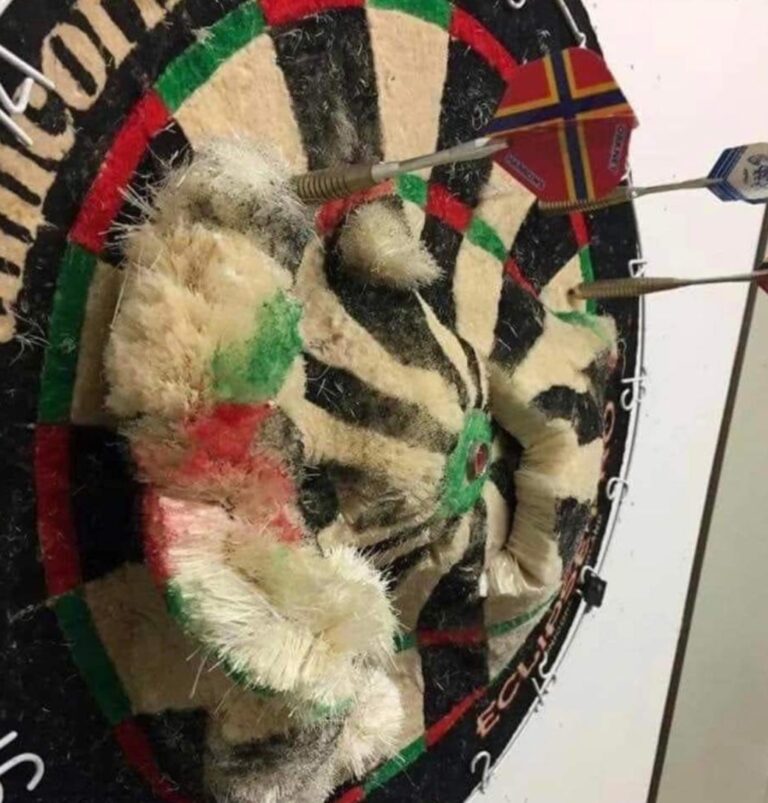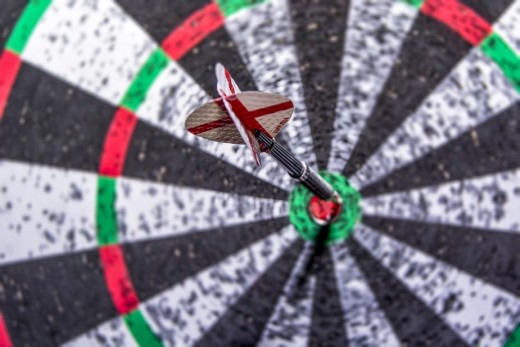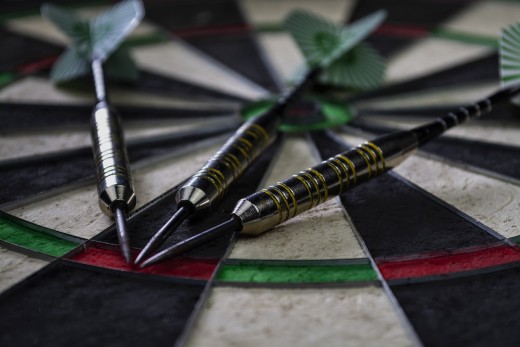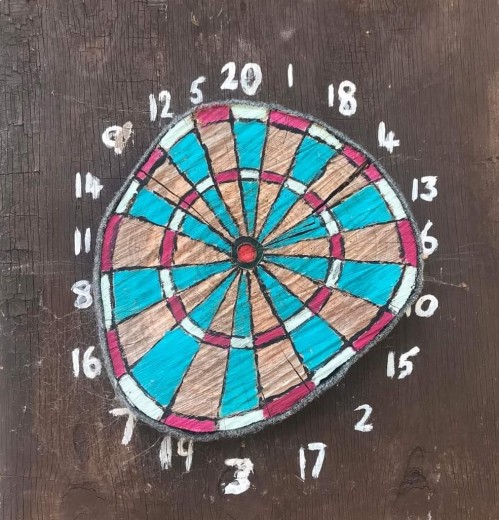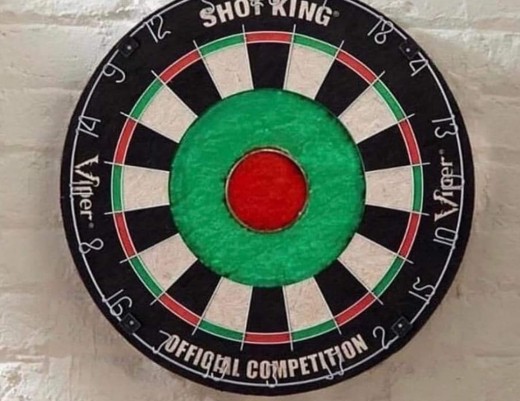Thursday, August 20, 2020
Column 592
Setting the record straight, again!
After almost 25 years of publishing columns and books about darts it should come as no surprise that I am asked a lot of questions – but not about darts. Most often I am asked about women and elephants. I suppose this is because it’s so widely known, at least by those who’ve seen me compete, that I don’t know Jack Shit about darts.
The truth is I don’t know squat about women either. Find me someone who claims they do, and I’ll find you someone who says they’ve thrown five 180’s in a row. They’d both be lying sacks of dog poo.
I do know something about elephants. More on that in a moment.
SEX SELLS
Let’s get this straight. The Double Out Shots that appear each month at this website were not my idea. The idea – and it’s a frickin’ great one – came years ago from Australia’s Kevin Berlyn. So, if you want to call someone a “vulgar, sexist pig” he’s your main man. But he’s also one smart dude.
Berlyn understands that our sport needs more than just fancy stages like that big orange and purple thing the PDC used to erect in Las Vegas. The sport needs more than a bunch of big money tournaments at casinos. It needs more than tuxedo-clad Masters of Ceremony like John McDonald and booming-voice callers like Russ Bray. It needs more than gigantic electronic scoreboards, fog machines, walk-on music and walk-on girls. As incredibly attractive as Sid Waddell was, he was just not enough!
The sport needs sex appeal and it needs it on the line.
“If you build it, they will come,” whispered the mysterious voice to Ray Kinsella in Field of Dreams. “Bring on the BABES,” say I “and the audience will tune in.” Bring on Jess Nicoll. Bring on Charity Buntz, Tee Ruleman, Julie Heckman, Christina Oakley, Holly Young, Tina DiGregorio and Keri Stevenson. Find Lori Verrier for chrissake! Get some MUD!
Okay, skip the mud.
If you want to attract a television audience it’s past time somebody (besides the producers of Dancing with the Stars, Kevin Berlyn and, yes, Dartoid’s World) remembered that sex sells. It’s selling tennis. It’s selling golf. It’s selling soccer. It’s selling swimming. It’s selling volleyball. It’s even selling poker (Google “Shannon Elizabeth” if you doubt me).
I don’t care how you do it. And it doesn’t matter a whit where any of the ladies I have named are rated in the American Darts Organization’s (ADO) points standings. Does the ADO still exist?
If you want darts to pull in the television ratings you have to make darts sexy – and with all due respect to you ladies out there who don’t fall out of your halter tops when you set up at the oche, this is just the way it is.
Athletic performance alone is not enough to build strong ties between players and the fans. Men (who comprise over 70% of the sports viewing audience in this country) want to see near-naked women. We’re sickos perhaps but were not the only ones.
The ladies are sickos too. Make no mistake about it.
Just as Anna Kournikova, Lisa Harrison, Heather Mitts, Jenny Thompson, Lokelani McMichael, Michelle Wie, Gabriel Reece, Laila Ali and Danica Patrick have contributed to the television appeal of their sports by drawing in the male audience, sexy men have contributed to the television appeal of their sports by drawing in the female audience.
Just try telling me that women didn’t tune in to watch Michael Jordan – or that they flipped the channel when he appeared in a boxer commercial. Just try telling me that women are not drawn to David Beckham, Tom Brady, Alex Rodriguez, Ian Thorpe, Andy Roddick, Jason Taylor and Jose Theodore for more than their sporting skill (or their money). It’s simply not so.
It could be the same in darts.
Nicknames like The Power, The Wizard, and Voltage are not enticing enough (what they are is stupid), 180s and even perfect games are not spectacular enough to pull in the crowd. None of this, no matter how well framed with stage props and pizzazz, can mask the reality that darts players, at least most of those at the top of the ranks, have an image problem.
Anna Kournikova never won a Grand Slam (singles) tennis tournament, but more television viewers turned in to watch her in her heyday than tuned in to watch the men. Jason Taylor probably has a trophy room the size of my house, but I assure you that women who don’t know the different between a touchdown and a home run tuned in in droves after watching him foxtrot in prime time.
What the sport of darts needs to garner a viewing audience is players, men and women, with sex appeal, personality, and skill and not necessarily in that order. Darts fans are just not going to tune in to see some tattooed fat boy in a beer-stained shirt fill up the triple twenty. They just aren’t.
But they will tune in – I flat-out guarantee it – if the promotion for a darts tournament were to feature the appearance of, say, Mieke de Boer, who posed for Playboy in The Netherlands in 2005 and who won the World Darts Trophy and the British Open in 2002.
Now, let me name some of the male darts players women drool over…
I don’t know why exactly (really, I don’t) but women I know frequently talk (just like the men do about some of the ladies), about Bill Bell, Rob Heckman, Dan Zimmerman, Roger Carter, Bob Gargan and Brad Wethington. This is absolutely all I’m going to say about the men because it gives me the CREEPS!
But the fact remains, whether people want to admit it, or accept it or not, just as the sport needs to market the babes it also must market the pretty boys.
Now, there are some who say none of this matters, that there is no market for televised darts in America and they are – how do I put this diplomatically… idiots.
Was there a market for women’s basketball? Of course, there was, but it wasn’t realized until there was professional marketing. Recognize, for example, that the market for women’s tennis was much smaller than for the men until it was marketed with sex-appeal. The Wimbledon women’s final now pulls more television viewers than the men’s single final. This didn’t just happen. It’s happening because of a plan. The same applies to women’s golf. The Ladies Professional Golf Association (LPGA) has a formal five-point plan to attract more fans. One of the points in that plan is to market sex-appeal. The same goes for volleyball. The transition to short skirts and skimpy outfits in these sports occurred by design and it opened the television market.
Of course, there is a market for televised darts in America! If there wasn’t the PDC wouldn’t have tromped from coast to coast investing money trying to crack the market. Despite what most would call lackluster at best (in terms of both promotion and production) the old World Series of Darts premier episode drew nearly half as many viewers as an average airing of the World Series of Poker.
The World Series of Darts was not a bust. The result simply underscored the opportunity that is there for the taking. The sports business in this country is no less an entertainment machine than the film and music industries. And just like the film and music industries, the sports business is looking for sexy celebrities.
Once the sport of darts is marketed to television executives with words and images the executives understand – yes, sex appeal – the market will expand and from that, since advertisers are interested in the exact same thing, will come the opportunity to convince potential sponsors to step to the plate.
Now, I know that to some the very concept of marketing sex appeal is an anathema. The promotion of athletes, particularly women, on the basis, even in part, of sex appeal is considered by some to diminish their abilities. It poisons the minds of little girls (apparently causing them to dream of posing nude for Playboy). It’s unfair for someone like Michael Jordan to make millions wearing next to nothing in commercials while Brandi Chastain was chastised for flashing her sports bra.
Crap, all of it. Sorry folks. Live with it. Athletes in the ancient Olympic Games competed in the nude. Today most of our female athletes, dressed modestly as most do, would probably be stoned in many countries in the Middle East. It’s an inconsistent world.
Anna Kournikova may never have won a Grand Slam tennis tournament, but she’s made millions off her well marketed sexy image – the number of Americans and others worldwide who watch televised tournaments have increased. Kournikova helped her sport and it was no accident.
Her game plan was genius and it was founded on the one concept that is, always has been and always will be consistent in this world: sex sells. This is the same game plan that is needed to take the sport of darts to the Big Time in America.
It all comes back to sex appeal. That’s what sells. It always has and it always will. Sex appeal is selling frickin’ everything and it has been since the day Eve snagged Adam by sauntering into the Garden of Eden in that cute little Victoria’s Secret number. And Double Out Girls are attracting readers to Dartoid’s World. Just yesterday somebody clicked on this month’s Double Out shot 2,116 times. His name was Howie Reed.
It is sex appeal that is the key to the future of darts promotion.
ELEPHANTS
Second only to being asked about and sometimes criticized for featuring scantily clad women at this website I receive questions about the time I threw darts against an elephant at the Nong Nooch Botanical Garden in Pattaya, Thailand. Most often the questions come in the form of condemnation from animal rights activists such as those who support the People for the Ethical Treatment of Animals (PETA), which it is worth noting, for years used sex-appeal – completely naked women – to draw attention to their anti-fur campaign. It’s also worth noting that the strategy has been incredibly successful.
In real life I am a fundraising consultant to animal protection organizations.
I care about animals. I have two dogs – one is a rescue who I carried back from Romania. My wife and I put food out every day for squirrels, racoons, opossum and birds. Even rats.
I have been involved in elephant issues for twenty years. I am very familiar with the cruelty involved in training elephants to perform in zoos and circuses. Years ago, a colleague and I worked with Ian Douglas Hamilton, Cynthia Moss and others to strike a deal to end the Kruger elephant cull in South Africa (my colleague did far more than me!). I have been involved in zoo elephant issues from Bombay to Manila and Hanoi. And I am intimately aware of related issues in Thailand. I was the person most directly responsible for negotiating the deal to enact an ordinance to have elephants removed from begging in the streets in several of the major cities there.
The situation in Thailand is unique. The relationship of the people with elephants is tightly intertwined. Years ago, elephants were used as tanks in war. They were then used as trucks in the commercial logging industry. An estimated 4,000 elephants live today at monasteries where they spend their entire lives revered – while being eternally chained by the leg to trees through the heat and monsoons.
When the logging industry was banned (even chain saws are outlawed today) the “unemployed” elephants and their handlers (destitute people known as mahouts) resorted to begging in the streets, where late at night the elephants would wander the streets with their handlers, eat trash and cigarette butts and beg; the payer of a few baht would feed the elephant a slice a fruit and then walk underneath the elephant’s legs for good luck. The ordinance I worked to have passed made this illegal. The quid pro quo was to arrange for small sanctuaries where the mahouts and their (already trained) elephants could live, eat, and quite literally survive by entertaining locals and tourists. It was a creative, although not perfect, solution to a terrible situation.
Today, there are few options for elephants in Thailand. There are very few left in the wild. There are some in zoos who live a miserable existence, waiting to die. There are those at the monasteries whose existence is no better than the life of those at the zoos.
And then there are elephants such as the one I threw darts with (Omsin) – who are the few remaining of those who once walked the streets at night. Except for the lucky elephants who have found their way to legitimate sanctuaries (there are very few) these elephants are far and away the best treated. Indeed, the first time I visited Nong Nooch there were no elephants. Now there are and they wander a very large area, have a lake, nutritious food, and are cared for constantly by their handlers (the same mahouts who used to walk them through the streets at night to beg to survive).
As someone who understands the issue and has been involved in many aspects of it for more than 30 years, particularly in Thailand, I do not believe that what I did was inconsistent with what many who care about elephants might do if they fully appreciated the intricacies of the situation in Thailand. You can be certain that did I not feel this way I would never have agreed to play darts with Omsin.
Omsin, and other elephants were unmercifully beaten into submission with bull hooks. This is a fact. This is what was done to turn them into tanks, trucks, and street beggars. This is what is done to elephants worldwide to force them to behave in zoos and perform unnatural tricks in circuses. This is what was done to make Omsin into a darts throwing phenomenon. Yes, it is horrible – yet in Thailand and in many situations, it is a fact of survival.
I do not accept that throwing darts with an already trained elephant suggests that I in any way condone cruelty to elephants, or any animal. I do not accept that throwing darts against an already trained elephant glorifies abuse any more than any rational person would accept that eating tofu shaped and flavored like meat glorifies eating meat or wearing a faux fur glorifies trapping, killing and skinning an animal to wear it.
But none of this holds water with many animal rights activists. I am a bad guy. I am “unethical” and “hypocritical” and I “exploited” Omsin and all animals just as they, in the case of PETA, “exploit” women. I vehemently disagree – I support PETA’s strategy just as I champion the same strategy to promote darts. Sex appeal sells. Controversy sells. Neither qualifies as “exploitation.” If throwing darts against an already trained elephant in a unique culture like Thailand to promote darts works then that’s fine by me.
Yet, I nearly lost a client because of it.
My efforts to discuss my point of view and to listen to the point of view of others were rebuffed and ridiculed. Unfortunately, this is the signature response of some in the animal rights (not animal welfare) movement. Self-righteous denunciation, holier than thou intolerance. It’s either their way or the highway. Either agree or you’re the enemy. They hurt their own cause as a result.
So, I made the decision. Quoting Winston Churchill’s address to Harrow School in 1941, I informed them that due to “convictions of honour and good sense” I was moving on, that they would have to find someone else to represent them.
It’s the same in darts. Soft-tip players are renegades – the game isn’t pure. It’s Tupperware. It’s a toy. The targets are too big. Bounce outs count. We shouldn’t have to pay to play. Bullshit.
To call someone names simply because you do not agree with them only drives a wedge and to do so suggests that that is one’s intent. To recognize that just possibly the person with whom you disagree might have some kind of point or at least a rational perspective (whether you agree or not) and to make an effort to explore that possibility is the only way to find common ground – or to truly agree to disagree. In many cases, perhaps most, it’s safe to say that conversation instead of condemnation will lead to a finding that those who have opposing viewpoints have far, far more upon which they agree than disagree.
Politics aside, I believe and I would think most would, as philosopher Tom Regan wrote, that “at the deepest level human ethics is based on the independent value of the individual” and therefore “all individuals have the right to be treated with respect.” Surely most animal rightists would agree with Regan that the “philosophy of animal rights demands that logic be respected… hence any argument that plausibly explains the right of humans to be treated with respect implies that non-human animals have this same right, and have it equally.” It’s odd that many animal rights activists don’t respect one of the most basic tenants of their own philosophy.
If we – those who condemn me for throwing darts with an elephant – agree on the above, then perhaps we might both find a way to embrace the concept of respect in our dealings with each other. I know I have tried to understand – and certainly respect – the view of those who have condemned my throwing darts with Omsin.
I came out of animal welfare and that is the vantage point from which I have long viewed the elephant situation in Thailand, and still do. The solution to the street elephant problem there was an animal welfare solution. Of course, it wasn’t perfect. But it was the only solution, regardless of what some animal rights activists who’ve never even been to the country proclaim.
Tom Regan also wrote that “merely to reform injustice is to prolong injustice” and that “when an injustice is absolute one must oppose it absolutely.” This applies across the board – to women’s suffrage, slavery, gay rights. Who could possibly disagree? But people must also be appreciate that women, slaves and those of a different sexual orientation didn’t achieve justice overnight, and in many ways still haven’t.
Those who have little more than a Wikipedia education on the mahouts and elephants in Thailand cannot possibly grasp the reality of the situation on the ground. An animal rights solution was not realistic – not in any way whatsoever. An abolitionist position would have only served to prolong the injustice. A hard-core position, no matter its purity, would not have resolved the issue. Far more was accomplished for both the elephants and their destitute handlers by fashioning an agreement than by trying to force an all or nothing solution. Any such attempt would have guaranteed no solution and the elephants would still be wandering the streets in the wee hours eating cigarette butts.
DARTS, SEX, and ELEPHANTS
PETA’s anti-fur campaign goal is to educate people to the cruelty associated with killing an animal to wear it. Who doesn’t care about animals? Certainly, PETA does. I certainly do – my dogs are my family, not my pets. I don’t own them – I am their guardian. Sex appeal, not disrespect for women, is effectively promoting PETA’s “I’d rather go naked than wear fur!” message.
If “Double Out” shots of pretty girls attract readers to Dartoid’s World and the purpose of Dartoid’s World is to promote darts – and it is – then, well… it ain’t “exploitation” or “vulgar,” or “sexist” – it’s Marketing 101.
If throwing darts against an already trained elephant in a basically Third World country attracts readers to Dartoid’s World and the purpose of Dartoid’s World is to promote darts then, again, it ain’t “unethical” or “shameful” or in some way promoting the abuse of animals.
Respect for women and animals and basic marketing are no more mutually exclusive than the motivation of soft-tip proponents is the antithesis of steel-tip purists: darts should be fun.
The bottom line in the Book of Dartoid’s World is if pretty women and elephants can help sell darts and soft-tip can attract hordes of new players to the line there ain’t a damn thing wrong with any of it.
Disagree with me if you wish. Condemn me if you choose. It’s your right. But I am not the enemy of women or elephants. I am a fan of both.
And darts.
From the Field,
Dartoid


